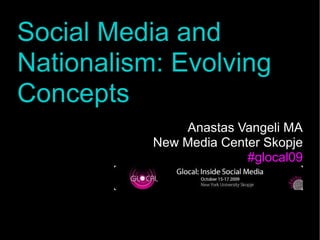
Social Media and Nationalism: Evolving Concepts
- 1. Social Media and Social Media and Nationalism: Evolving Nationalism: Evolving Concepts Concepts Anastas Vangeli MA New Media Center Skopje #glocal09
- 2. Presentation Outline Nationalism and Internet: Basic Approaches Reflections on Nationalism and Social Media Survey and Examples Shortcomings Concluding Remarks
- 3. Statement Social media extension to reality Nationalism is real, at least discursively Therefore social media “extend” nationalism Nationalist sentiment + use of social media = reframed, arguably advanced concept of nationalism
- 4. Nationalism and Internet: Basic Approaches Erica Schlesinger Wass, Addressing the world: national identity and Internet country code domains, Rowman & Littlefield, 2003 Contested domain names: the case of Macedonia: Greek vs. RM Macedonian domains, Macedonian and Bulgarian VMRO domains Sociological approach: Eriksen and Bakker
- 5. Nationalism and Internet: Basic Approaches T. H. Eriksen: the Internet (media) can nevertheless be instrumental in creating and re- creating a shared, collective past among its users. Examining the role of the Internet in building and maintaining national identities may thus enhance our understanding of the character and the enduring power of national myths and symbols.
- 6. Nationalism and Social Media Major changes brought by social media, both on individual and social level Fragmentation, decentralization, and the emergence of user-generated content Social networking, virtual individuals and virtual “collectives” Nationalist PR and brainstorming via social media
- 7. Nationalism and Social Media Social media related to the emergence and development of strong and durable forms of nationalism-from-below, or a genuine decentralized form of nationalist discourse notably different from everything before No need for nationalist leaders, elite, budget, headquaters to produce nationalist propaganda Social Media as an asset to nationalist mobilization
- 8. Nationalism and Social Media The modernist/constructivist/instrumentalist approaches to the nation are challenged with the idea of decentralization as there is no more just one single and most important agency of the nationalist mobilization; there are plenty and they have the possibility to reach anyone. The ethnosymbolist approach is challenged too: it is not THE exclusive single shared narrative that prevails as a crucial factor of mobilization, but the one which the Wikipedia contributors agree upon.
- 9. Nationalism and Social Media Nation reshaped: one of the basic premises was that the nation is imagined because its members will never meet the rest of their fellows. However, with the possibility that social networking offers, it is very simple for people that share interests to find each other, and befriend each other, even though it is online. The imagined “horizontal friendship” of the nation gradually becomes very concrete – yet no less imagined.
- 10. Facebook Nationalism: A Survey (Methodological shortcomings) 98 respondents 85% said that were invited to a nationalist/patriotic group/page/cause Only 4% said they have never seen nationalistic/patriotic content being posted More than half see such contents frequently
- 11. Counting the Members of the Nation
- 12. 34K Facebook Users Hate Greece
- 13. 60K People “Kosovo is Serbia”
- 14. 50K Serbs Get Ready to “Welcome” Croats. Time needed: 10 Days
- 15. General Impressions: Facebook More support for “United Macedonia” than “United Ireland” => Most of nationalist content originates from SEE? Radical and hate groups sanctioned fast (ex. Knife, Wire, Srebrenica; Holocaust Deniers)
- 16. Shortcomings Generalization of what is nationalism Replace nationalism with _______ and you might get similar results Lack of content analysis
- 17. Concluding Remarks Nationalism not outdated even in post-industrial age Social media content not necessarily progressive The two (can) coexist Social media an asset to nationalism Surging nationalism 2.0?